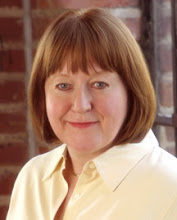
Maybe it was the simple fact that my parents were, on average, a good ten years older than most of my peers' parents and I was born when my mother was nearly 40. But, for me, The Great Depression informed nearly every minute of my childhood and teenage years—from the “turn off that light. What do you thing we are? Made of money?” to the constant depression-glass lens through which every experience was viewed.
Growing up, I often felt that my parents had more in common with my friends’ grandparents than their parents. They were, after all, in their early 20’s during the Thirties. My father had ridden the rails, working at jobs anywhere he could find them from construction work in San Francisco to building carnival rides and barnstorming with the Eyerly Brothers in his home town of Salem, Oregon. My mother had travelled to the alluring West from the northern, frozen North Dakota plains in search of love and work in that order. At home, we canned, baked bread, sewed our own clothes, and repaired everything. But, then, we were “lower middle or working class,” a term that seems to have disappeared in the economic halcyon days that followed.
Laying my rather peculiar past aside, most of us boomers did have parents who grew up and survived the depression, remembering the scarcity and the deprivation, which was then followed by the war years. But what lessons did we take away—from them, then and now? Very few. It might even be said that we tried very hard to avoid those lessons. Although the Green Movement may have grown out of the social activism of the ‘60’s, most boomers were not socially committed at the time and very few continued along the social activism pathway, except perhaps where it involved social, sexual and personal freedom. Lots to be argued with here.
Mostly, we boomers and our children have experienced over-abundance and have relished in it. I cannot count the number of times people have said to me lately that they could never have conceived the economy turning downward the way it has. Having to cope with less for many of us has seemed like an early death sentence. I am supposed to be enjoying these years. Isn’t that the American Dream?
Now, so many commentators have pointed out that we as a Nation may finally be learning our lessons—about having enough, about frugality, about sustainability, about valuing experiences and people over labels and stuff—that I have lost track. I actually believe, on the other hand, that the current Great Recession is actually only building up pent-up demand among many people. The minute conditions ease, we will probably see ourselves returning to our old ways.
Only this time, we can’t afford such self-indulgence, if we ever could. The abundance we thought we enjoyed was actually a delusion. Remember those books we all bought in the late ‘60’s and early ‘70’s—Frances Moore Lappe’s Diet for a Small Planet and Steward Brand’s The Whole Earth Catalog. Their messages have even greater relevance, urgency, and poignancy today. Ignoring them now is not auguring a symbolic early death sentence, but tolling a death knell for the planet.


1 comment:
Love to read your stuff! I'm ghost writing a weekly blog myself on the subject of health and wellness. It's so enjoyable.
Post a Comment